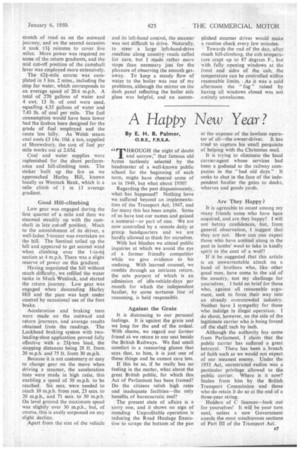A Happy New Year?
Page 41

If you've noticed an error in this article please click here to report it so we can fix it.
By E. H. B. Palmer, F.R.S.A.
UPTIHROUGH the night of doubt
I and sorrow," that famous old hymn tactlessly selected by the headmaster of a welt-known public school for the beginning of each term, might have cheered some of us in 1949, but what about 1950?
Regarding the past dispassionately, what has happened? Nothing have we Suffered beyond an implementation of the Transport Act, 1947, and for many this has been ample. Some of us have lost our names and gained a numeral—or part of one. We are now controlled by a remote deity at group headquarters and we are hardly allowed to think for ourselves. . With hot blushes we attend public inquiries at which we avoid the eye of a former friendly competitor while we give evidence to his undoing. With learned counsel, we ramble through an intricate return, the sole purport of which is an admission of idle-vehicle-days per month for which the independent haulier, by some tortuous line of reasoning, is held responsible.
Against the Grain
It is distressing to our personal feelings. It is against the grain and we long for the end of the ordeal. With shame, we regard our former friend a's we return to our seat beside the British Railways. We find small comfort in a reassuring glance that says that, to him, it is just one of those things and he cannot care less.
If this be so, if he really has no feeling in the matter, what about the great British public, for which this Act of Parliament has been, framed? Do the citizens relish high rates and inadequate facilities—the only benefits of bureaucratic zeal?
The present state of affairs is a sorry one, and it shows no sign of mending Unprofitable operation is inducing the Road Haulage Executive to scrape the bottom of the pan at the expense of the lowliest operator of all—the owner-driver, it has tried to capture his small perquisite of helping with the Christmas mail.
It is trying to eliminate the local carrier-agent whose services had been a godsend to the railway companies in the "bad old days." It seeks to shut in the face of the independent haulier the gates to docks, wharves and goods yards.
Are They Happy?
It is agreeable to count among my many friends some who have been acquired, and are they happy? I will not betray confidences, but, from general observation, I suggest that they are not. How, can one expect those who have ambled along in the past in lambs' wool to take in kindly spirit to the coat of a wolf?
If it be suggested that this article is an unwarrantable attack on a band of brothers who, like other good men, have come to the aid of the country, test my challenge for yourselves. I hold no brief for those who, against all reasonable argument, seek to force their way into an already overcrowded industry. Neither have I sympathy for those who indulge in illegal operation. I do shout, however, on the side of the legitimate carrier who is being forced off the shelf. inch by inch.
Although the authority has come from Parliament, I claim that the public carrier has suffered a great betrayal. There has been a, breach of faith such as we would not expect of our meanest enemy. Under the 1933 Act, unrestricted radius was particular privilege allowed to the public carrier. Where is it now? Stolen from him by the British Transport Commission and those who do retain it do so at the end of a three-year string.
Holders of C licences—look out for yourselves! It will be your turn next, unless a new Government annuls the most mischievous sections of Part III of the Transport Act.




























































































